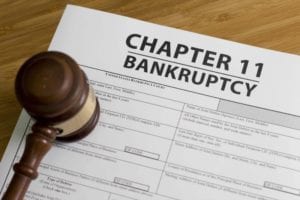 Chapter 11 Bankruptcy. The filing of a personal bankruptcy petition creates what is known as the bankruptcy estate. This is a separate taxable entity for IRS purposes. As a result, a person’s tax obligations do not end with the filing of a bankruptcy petition. Rather, those obligations vary depending upon the type of bankruptcy filing, and responsibilities may turn upon whether the debtor remains a “debtor-in-possession” of his or her own personal assets, or whether a bankruptcy trustee is appointed to administer the assets after the filing of the bankruptcy petition.
Chapter 11 Bankruptcy. The filing of a personal bankruptcy petition creates what is known as the bankruptcy estate. This is a separate taxable entity for IRS purposes. As a result, a person’s tax obligations do not end with the filing of a bankruptcy petition. Rather, those obligations vary depending upon the type of bankruptcy filing, and responsibilities may turn upon whether the debtor remains a “debtor-in-possession” of his or her own personal assets, or whether a bankruptcy trustee is appointed to administer the assets after the filing of the bankruptcy petition.
Where a debtor chooses to file a Chapter 11 bankruptcy petition and remains a debtor-in-possession, i.e. remains in possession of his or her assets instead of having a bankruptcy trustee appointed to retain those assets, the debtor must file both a Form 1040 and the Form 1041 for the bankruptcy estate, provided that the estate meets the return filing requirements. See Internal Revenue Service, Bankruptcy Tax Guide, Page 3, available at https://www.irs.gov/pub/irs-pdf/p908.pdf. Debtors-in-possession should bear in mind that although they remain in possession of their assets and a trustee has not been appointed, wages and income from self-employment earned during the bankruptcy case are property of the estate, and such income should be reported on the bankruptcy estate’s tax return (Form 1041). Failure to properly file tax returns on behalf of the bankruptcy estate can result either in conversion of the bankruptcy to a Chapter 7, or can lead to the appointment of a bankruptcy trustee. Id. at 2. Even spouses jointly filing for Chapter 11 with jointly administered bankruptcy estates are treated separately for IRS tax purposes, and as a result each spouse much file both for him or herself and for their own bankruptcy estate. Id. at 3.
Corporations and partnerships, unlike persons filing for Chapter 11 bankruptcy protection, need not concern themselves with a separate taxable estate, as none is created when these entities file for Chapter 11 bankruptcy protection. Filing requirements for corporations and partnerships effectively do not change with the filing of a Chapter 11 bankruptcy petition; however, a newly appointed trustee or receiver, or if no such trustee or receiver has been appointed then the debtor-in-possession must file Form 1065 or Form 1120 on behalf of the debtor. Id. at 21.
Whether an individual, corporation or partnership, these and other facts should be reviewed, and a licensed attorney experienced in tax and/or bankruptcy law should be consulted, prior to proceeding with a Chapter 11 bankruptcy filing.
Chapter 13 Bankruptcy
Chapter 13 of the bankruptcy code provides for bankruptcy protection, or the “adjustment of debts” of an individual with regular income, thereby allowing an individual with income to enjoy that income while also enjoying the benefits of bankruptcy protection. As a result, Chapter 13 bankruptcy protection is not available to corporations or partnerships, and the requirements are somewhat higher with respect to individuals. This is in part an effort to balance out the leniency given to debtors by this particular chapter of the bankruptcy code, which allows a debtor to retain regular income while obtaining bankruptcy protection from crushing debts. Additionally, the filing of a Chapter 13 bankruptcy petition does not create a separate taxable estate, and even if a Chapter 11 is converted to a Chapter 13, there will be no resulting taxable estate separate and apart from the debtor. Despite this higher threshold for Chapter 13 protection, interest on trust accounts held by the trustee in a Chapter 13 bankruptcy is not to be included as part of the Chapter 13debtor’s taxable estate.
As of 2005, the Bankruptcy Code began to require that a Chapter 13 debtor file all required tax returns for tax periods going four years back, i.e. ending within four years of the debtor’s bankruptcy filing. The bankruptcy code further provides that these federal tax returns must be filed with the IRS before the date first set for the first meeting of creditors. See Internal Revenue Service, Bankruptcy Tax Guide, Page 2, available at https://www.irs.gov/pub/irs-pdf/p908.pdf. That said, there are situations where the deadline to file past due tax returns may be extended; the debtor may petition the trustee to extend the window for filing of past due returns for 120 days.
Chapter 13 debtors must also file tax returns that come due after the Chapter 13 bankruptcy proceeding commences. In addition, a number of taxes are deemed to be exceptions from the Chapter 13 discharge, i.e. Chapter 13 protection does not apply to these taxes. They include withheld taxes, taxes for which a return was not filed, taxes for which a return was untimely filed within two years of the bankruptcy filing, and taxes owed in connection with a taxpayer’s attempt to defraud or evade or defeat his or her tax obligations. Id.
Individuals seeking to petition for Chapter 13 bankruptcy protection should consult a licensed attorney experienced in tax and/or bankruptcy law.
______________________________________________________________________
Please keep in mind the information and advice presented in this blog is not intended to be used as formal legal advice. Contact a tax professional for personalized tax advice pertaining to your specific situation. While we try and answer all parts of the question when we write our blogs, sometimes there may be some left unanswered. If you have any questions about your problems with the IRS, SBOE, FTB, or BOE, or tax law in general, call RJS Law at (619) 595-1655.

Leave a Reply